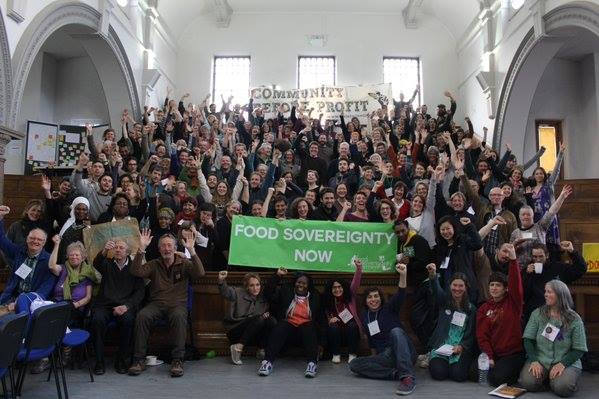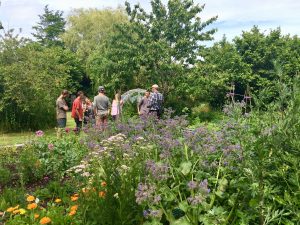Agroecology is the application of ecology to the design and management of sustainable agroecosystems. Agroecology has been described as a whole-systems approach to agriculture and food systems development based on traditional knowledge, alternative agriculture and local food system experiences. The field of agroecology has been framed as simultaneously being a movement, science, and practice.
Agroecology as a Movement

We see the political aspects of agroecology as inseparable to the science and it’s practical application. We aim to actively support social struggles to transform how we produce, consume, and distribute food. In our educational work we never seek to neutralise or depoliticise agroecology. We aim to support individuals and groups to learn how to better collectively organise for social change.
“Families, communities, collectives, organizations and movements are the fertile soil in which Agroecology flourishes. Collective self-organization and action are what make it possible to scale-up Agroecology, build local food systems, and challenge corporate control of our food system. Solidarity between peoples, between rural and urban populations, is a critical ingredient.”
– Declaration of the International Forum for Agroecology, Nyéléni, Mali:
27 February 2015
Agroecology as a Science
 In our education as agroecologists, we have drawn our knowledge from the existing fields of horticulture, permaculture, regenerative agriculture, biodynamics, ecology and more. We support a culture of People’s Science and collective inquiry. We see agroecology as a bridging model between indigenous ways of knowing the land and ecological science, while having the political literacy to observe power relationships between them.
In our education as agroecologists, we have drawn our knowledge from the existing fields of horticulture, permaculture, regenerative agriculture, biodynamics, ecology and more. We support a culture of People’s Science and collective inquiry. We see agroecology as a bridging model between indigenous ways of knowing the land and ecological science, while having the political literacy to observe power relationships between them.
We reject the appropriation of agroecology and its promotion as merely a set of agricultural technologies.
“Today, agroecologists, whether farmers or scientists, are working together to defend rural communities and agroecological cultures against the negative impacts of capitalist industrialization. While this struggle is a global one, human experience of such impacts remains place-based, and the local values, knowledges, institutions, and cultures of socioecologically situated people must be core elements in the construction of ecological sustainability and social justice. If the science of agroecology is separated from the agrarian social thought and movements with which it has grown up, we would argue that its transformative potential will be lost and agroecology will become just another instrumental discipline in the continuing saga of capitalism’s struggle to overcome its own internal contradictions.”
– Guzmán and Woodgate
Agroecology as a Practice
 The production practices of agroecology are based on ecological principles like building life in the soil, recycling nutrients, the dynamic management of biodiversity and energy conservation at all scales. Agroecology drastically reduces our use of externally-purchased inputs that must be bought from industry. There is no use of agricultural chemicals, artificial hormones, GMOs or other dangerous new technologies in agroecology.
The production practices of agroecology are based on ecological principles like building life in the soil, recycling nutrients, the dynamic management of biodiversity and energy conservation at all scales. Agroecology drastically reduces our use of externally-purchased inputs that must be bought from industry. There is no use of agricultural chemicals, artificial hormones, GMOs or other dangerous new technologies in agroecology.
To learn more about agroecology, please find lots of downloads in our resources section.
To read more about our pedagogy as a collective, click here.